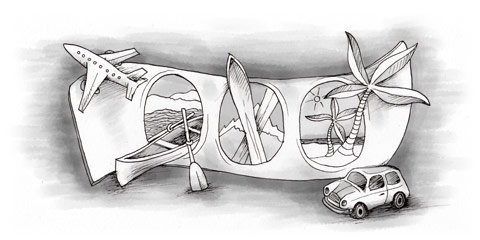Poor road design and shoddy workmanship have added to road problems and cost the British taxpayer millions of pounds each year. Many suburban roads are full of potholes, particularly in London where some councils cannot afford to repair them. Roads in all areas are often badly repaired after being constantly dug up by utility companies (telephone, electricity, gas, water, cable television) and local councils. It’s estimated that some 600,000 holes are dug each year in London’s roads alone, around double the national average.
Speed ‘bumps’, known as ‘sleeping policemen’, are a common sight, particularly in residential areas, near schools, on private roads, in university grounds and in car parks. They’re designed to slow traffic (or wreck your suspension) and are sometimes indicated by warning signs as, if you fail to slow down, it’s possible to turn your car over. (People have been killed after hitting speed bumps at high speed).
The UK has a smaller motorway network than many other western European countries. The controversial M6 toll road, currently bypassing Birmingham, may be joined by a much longer toll road on the M6, linking Birmingham to Manchester. It’s impossible to introduce toll booths as used on the continent and vehicles would be fitted with a transponder which would communicate with toll-charging gantries installed on motorways. Motorists would receive a monthly bill. Tolls are expected to create havoc on other roads, as motorists desert motorways for A and B roads.
The Severn Bridge was privatised in 1991 and there are now two separate bridges. There’s a toll charge of £5.10 for cars when crossing westwards only (crossing eastwards doesn’t incur a charge). Another significant toll area is the Dartford Crossing, which is an integral part of the M25 orbital motorway around London (although not in fact a motorway) and crosses the Thames to the east of the capital. Travel north is by tunnel, south by bridge and the toll for cars is either direction is £1.
Motorway travel in the UK is generally fast, although it’s often slowed to a crawl by road works and the ubiquitous contra-flow, where two-way traffic occupies a single carriageway. However, despite their high traffic density, motorways are the UK’s safest roads, accounting for just 3 per cent of all casualties. Casualties on town and rural roads are proportionately very much higher. By the year 2020, traffic on motorways is set to rise by between 50 and 100 per cent (there are already numerous bottlenecks during rush hours and even all day on some sections).
Emergency SOS telephones are located on motorways, where arrows on marker posts at the roadside indicate the direction of the nearest telephone. The hard shoulder on motorways is for emergencies only and you mustn’t stop there simply to have a rest (for which you can be fined). The hard shoulder is a dangerous place to stop and many fatal accidents on motorways involve vehicles stopped there.
Road Taxes in the UK
Road tax (officially called ‘vehicle excise duty’ or ‘vehicle licence’) is required for all cars. Vehicles registered before March 2001 are taxed according to their engine size: vehicles with engines of less than 1,550cc are taxed at £115 per year and those with engines of 1,550cc and over at £180 per year. However, vehicles registered after March 2001 are taxed according to the number of grams of carbon dioxide (CO2) their engines emit per kilometre driven, as shown in the table below. Emission levels are related to the size of a car’s engine as well as to the type of fuel, and since March 2006 cars are divided into seven ‘bands’ according to engine size.
Motorcycles are taxed according to engine size: those under 150cc at £15 per year, those between 151 and 400cc at £30, those between 401 and 600cc at £47 and those with larger engines at £64 (£35.20 six months). Three-wheeled motorcycles over 150cc are taxed at £64 (£35.25 six months)
Road tax is usually paid at a post office, where forms and information leaflets are available (spendthrifts can purchase £5 stamps to help save for their road tax). If you’re registering a vehicle for the first time, it’s possible to license it for part of a month plus 6 or 12 months. To obtain your road tax disc, you must complete a Vehicle Licence Application Form (V10). Notes about registering and licensing a vehicle are contained in leaflet V100 (a separate licence and form is required for a heavy goods vehicle). Take your completed form V10 to any post office with your vehicle registration document or a completed form V62; a valid insurance certificate or cover note; a valid test certificate, if applicable; a disabled exemption certificate, if applicable; and the payment (e.g. cash or cheque).
Alternatively you can tax your car on line at www.dvla.gov.uk if you are the registered keeper of the vehicle and your name, address and any changes you have made to your vehicle have been updated on DVLA records. The easy to use service will take you step by step through the process. An electronic check will be made to confirm that you have the necessary insurance, vehicle test (MOT) and entitlement to disability exemption (if appropriate). A tax disc and receipt for payment will be sent to you through the post within five working days.
To tax your vehicle on line you’ll need the following:
- the 16 digit reference number printed in the yellow box on the front of your renewal reminder or the 11 digit reference number found on the front of your Vehicle Registration Certificate and your vehicle registration number;
- a debit or credit card, (there is a £2.50 service charge on credit card transactions);
- a vehicle test certificate (you must have been issued with a new style certificate to use the service);
- insurance, which will be checked on the Motor Insurance Database run by the Motor Insurers Information Centre (you cannot use the service if you have recently changed your Insurance Company);
- Entitlement to disability exemption (if applicable).
You can also apply by phone (0870-850 4444 or textphone/minicom 0870-850 4445). Some applications must be made at a Vehicle Registration Office (VRO), which are listed in leaflet V100. After paying your road tax, you receive a tax disc showing the registration number and the date to which duty has been paid. This must be displayed on the inside of the windscreen of your car on the left-hand side (top or bottom). It’s usually inserted in a plastic holder available from garages and motor accessory shops.
Road tax cannot be transferred from one vehicle to another, although you can obtain a refund for each whole month it still has to run, e.g. when you sell a car or take it off the road. To do this, you must remove the tax disc and take it with a completed form V14 (available from post offices) to any VRO or send it to Refund Section, DVLA, Swansea SA99 1AL. You should apply for an exchange tax disc if the taxation class of your vehicle changes, e.g. if you convert a car into a truck or motor caravan, or if you buy a vehicle with a licence which doesn’t cover your use of the vehicle. If your tax disc has been lost, stolen, destroyed or spoilt in any way (e.g. the figures cannot be read), you can obtain a duplicate licence for a small fee. Complete form V20 and send it to a VRO.
In recent years, there has been a clampdown on tax evaders. If a vehicle has been taxed since 1st January 1998, it must have a current tax disc or you must file a Statutory Off Road Notification (SORN) with the DVLA. If you use or keep a vehicle on a public road that isn’t taxed, you’re subject to a minimum fine of £1,000 plus you will need to buy a tax disc and pay any arrears owing since the vehicle was last taxed plus a £80 penalty. If you fail to file a SORN, the fine is also £1,000 and, if you make a SORN declaration when a car is being used or kept on a road, it could cost you £5,000 or two years in prison. You may also find your vehicle wheelclamped by a DVLA wheelclamping agent, in which case you will have to pay a release fee and produce a valid tax disc or pay a surety fee.
This article is an extract from Living and working in Britain. Click here to get a copy now.


